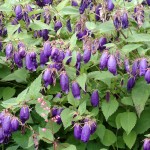
Campanula 'Sarastro' rated at the top in Chicago Botanic Garden trials. (Photo courtesy Terra Nova Nurseries)
One of the most tempting plants at garden centers is the bellflower, which always seems to be blooming.
Bellflowers (Campanula) are long-blooming perennials or biennials. In general, the plants spread by underground rhizomes, making some of them extremely invasive, so be careful about your choices.
The Chicago Botanic Garden recently released the results of an eight-year study of 89 taxa of campanulas. The bellflowers, sometimes called harebells, were planted in full sun, watered as needed and mulched. The plants were not fertilized or treated with any pesticides.
About half of the plants did well with the other half doing poorly or dying out every year. Among the disappointments were Campanula latifolia or great bellflower, and C. lactiflora, such as the popular ‘White Chips’ and ‘Blue Chips.’ There were 31 four-star winners, including ‘Purple Sensation,’ ‘Samantha,’ ‘Snow,’ ‘Superba,’ ‘Nana Alba’ and ‘Cherry Bells.’

Campanula 'Sarastro.' Photo courtesy Terra Nova Nurseries
There was only one five-star bellflower, ‘Sarastro,’ which has 2 ½-inch long violet-blue flowers that dangle from sturdy, 30-inch tall, upright stems. ‘Sarastro’ gets about 24 inches wide. If you remove the spent flowers, called deadheading, this plant will bloom from early June through July.
Plant in full sun and well-drained soil. Allow the soil to become moderately dry between watering. This campanula is winter hardy throughout Indiana. Although ‘Sarastro’ spreads by underground rhizomes, it is not considered invasive.
A lovely cut flower, ‘Sarastro’ is deer and rabbit resistant and it attracts hummingbirds. Use as a mass planting, ground cover or a border plant. It also would do well in a summer container, then transplanted to the ground in fall.
Good landscape companions include: ‘Moonbeam’ or ‘Crème Brulee’ threadleaf coreopsis (Coreopsis verticillata), ‘Anthea’ or ‘Moonshine’ yarrow (Achillea) or the silvery leaves of lamb’s ear (Stachys byzantina).
The Chicago Botanic Garden has been researching perennials for 25 years. Richard Hawke, the horticulturist who oversees the trials, will give a free talk, Proven Perennials, at 7:30 p.m., April 2 at the Tobias Theater at the Indianapolis Museum of Art. His talk is sponsored by the IMA’s Horticultural Society.